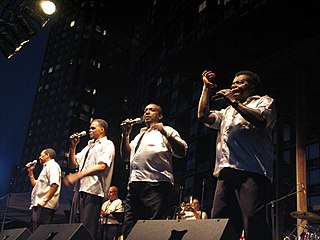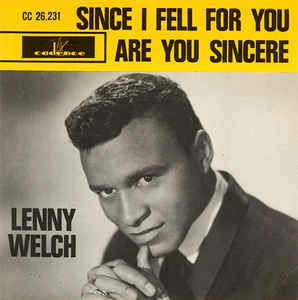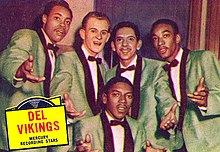
Doo-wop is a subgenre of rhythm and blues music that originated in African-American communities during the 1940s, mainly in the large cities of the United States, including New York, Philadelphia, Pittsburgh, Chicago, Baltimore, Newark, Detroit, Washington, D.C., and Los Angeles. It features vocal group harmony that carries an engaging melodic line to a simple beat with little or no instrumentation. Lyrics are simple, usually about love, sung by a lead vocal over background vocals, and often featuring, in the bridge, a melodramatically heartfelt recitative addressed to the beloved. Harmonic singing of nonsense syllables is a common characteristic of these songs. Gaining popularity in the 1950s, doo-wop was "artistically and commercially viable" until the early 1960s and continued to influence performers in other genres.

The Moonglows were an American R&B group in the 1950s. Their song "Sincerely" went to number 1 on the Billboard R&B chart and number 20 on the Billboard Juke Box chart.

The Flamingos are an American doo-wop group formed in Chicago in 1953. The band became popular in mid-to-late 1950s and are known for their 1959 cover version of "I Only Have Eyes for You". They have since been hailed as one of the finest and most influential vocal groups in pop and doo wop music history. In 2001, the band was inducted into the Rock and Roll Hall of Fame.

Little Anthony and the Imperials is an American rhythm and blues/soul vocal group from New York City founded by Clarence Collins in the 1950s and named in part for its lead singer, Jerome Anthony "Little Anthony" Gourdine, who was noted for his high-pitched voice. In addition to Collins and Gourdine, the original Imperials included Ernest Wright, Gloster "Nate" Rogers, and Tracy Lord, the last two of whom were subsequently replaced by Sammy Strain. The group was one of the very few doo-wop groups to enjoy sustained success on the R&B and pop charts throughout the 1960s. They were inducted into the Rock and Roll Hall of Fame on April 4, 2009, 23 years after the group's first year of eligibility for induction.
Doo Wop 50 is a television and DVD special created and produced by TJ Lubinsky, grandson of Herman Lubinsky. The special was inspired by a 1994 CD box-set of doo wop music which was also a development and production partner WQED in the program and dvd. It aired in December 1999.
"Come Go With Me" is a song written by C. E. Quick, an original member of the American doo-wop vocal group the Del-Vikings. The song was originally recorded by The Del-Vikings in 1956 but not released until July 1957 on the Luniverse LP Come Go With The Del Vikings. The final version was released in the second week of January 1957 and was led by Gus Backus. When Joe Averbach, the owner of Fee Bee Records couldn't handle the demand, he signed with Dot Records in late January 1957; the song became a hit, peaking at No. 5 on the US Billboard Top 100 Pop Charts. It also reached No. 2 on the R&B chart.
"I Only Have Eyes for You" is a romantic love song by composer Harry Warren and lyricist Al Dubin, written for the film Dames (1934) when Dick Powell introduced it. Several successful recordings of the song were made in 1934; later, there were charted versions by the Flamingos (1959) and Art Garfunkel (1975).
Prentice Moreland was an American R&B and doo wop singer of the 1950s and early 1960s.

"Since I Fell for You" is a blues ballad composed by Buddy Johnson in 1945 that was first popularized by his sister, Ella Johnson, with Buddy Johnson and His Orchestra.
The El Dorados were an American doo-wop group, who achieved their greatest success with the song "At My Front Door", a no. 1 hit on the US Billboard R&B chart in 1955.

"Silhouettes" is a song made famous by the doo-wop group the Rays in 1957, peaking at number 3 on the U.S Billboard Hot 100. A competing version by the Diamonds was also successful. In 1965 it was a number 5 hit in the US for Herman's Hermits, and in 1990 it was a number 10 hit in the UK for Cliff Richard.
The Charts were an American doo-wop group of the 1950s, most famous for their recording "Deserie".

Donald Edgar "Gus" Backus was an American singer. He started his career as a member of The Del-Vikings and later became a successful Schlager singer in Germany.
Maxfield Doyle Crook was an American musician, a pioneer of electronic music in pop. He was the featured soloist on Del Shannon's 1961 hit "Runaway", which he co-wrote and on which he played his own invention, the Musitron. He also recorded as Maximilian.
Kripp Johnson was an American singer for The Del-Vikings from 1956 to the 1980s. Johnson sang lead vocal on their hit "Whispering Bells", among other songs. He died of cancer in 1990 at age 57.
"Bad Girl" is a 1959 doo-wop single by The Miracles. Issued locally on the Motown Records label, it was licensed to and issued nationally by Chess Records because the fledgling Motown Record Corporation did not, at that time, have national distribution. It was the first single released on the Motown label – all previous singles from the company were released on Motown's Tamla label. Although The Miracles had charted regionally and on the R&B charts with several earlier songs, including "Got a Job", "I Cry", "I Need a Change", and "(You Can) Depend on Me", "Bad Girl" was their first national chart hit, reaching #93 on the Billboard Hot 100. Written by Miracles lead singer Smokey Robinson and Motown Records' President and Founder Berry Gordy, "Bad Girl" is a sad, remorseful ballad about a young woman, whom Robinson, as the narrator, says "was so good at the start", but who later in the song "is breaking my heart". It is in the popular doo-wop style, as several of The Miracles' songs were during the late 1950s. The record's success, coupled with the distributor's failure to pay Gordy and The Miracles properly for its sales, prompted Robinson to urge Gordy to "go national" with it, meaning that Motown should do its own national distribution of its songs, and eliminate the middleman, to ensure that all money from sales of its records would go directly to the label.
Fee Bee Records was a record label started by Joe Averbach in Pittsburgh, Pennsylvania. The label is notable for recording The Del-Vikings hit "Come Go With Me" in 1957. Other Del-Viking songs recorded on the Fee Bee label include "How Can I Find True Love," "Whispering Bells", "I'm Spinning", and "You Say You Love Me." "Come Go With Me" was quickly released to Dot Records for national distribution in late January 1957, followed by "Whispering Bells" and "I'm Spinning" in May and August 1957.
I'm Spinning is a doo-wop song recorded by the Del-Vikings on the Fee Bee Records label in 1957 in Pittsburgh, Pennsylvania as an A-side for the single "I'm Spinning"/"You Say You Love Me," written by Pat DiCesare. It was soon released on Dot Records for national distribution, and later released by Mercury Records when Kripp Johnson rejoined the Del-Vikings in 1958. Over the years the song has been included on many Del Vikings greatest hits albums and doo-wop compilation albums on various labels. The most recent release was in 2009.

"Whispering Bells" is a song performed by The Del-Vikings. It reached #5 on the U.S. R&B chart and #9 on the U.S. pop chart in 1957. Kripp Johnson was the lead vocalist on this recording. Clarence E. Quick, who was the bass vocalist in the group, wrote the song.

Charles Williams Wright is an American singer, instrumentalist and songwriter. He has been a member of various doo wop groups in the late 1950s and early 1960s as well as a solo artist in his own right. He is also the former leader and writer of hits for the group, Watts 103rd Street Rhythm Band.









